
CBPGuy
7 Years Experience
SouthWest, US
Male, 25
I am a U. S. Customs and Border Protection Officer on the southwest border between Mexico and the United States. I know the ins and outs of the job as seen on TV/News and things intentionally hidden from the media! There's more to this job than "Anything to declare?" I dont know all but I'll do my best to answer any questions you have! All answers are my opinion, and my opinion only!
Yes, every single entry and exit.
Do it! We need your help! All law enforcement agencies are in desperate need of female officers, not just CBP.
My biggest tip is to have thick skin. Your brothers in blue will be your biggest support as the people crossing the border size you up every day.
Legally, I cant comment on the level of communication between different branches of the government. What I can tell you is that it is in fact illegal to work as a visitor. This would be cause for a Expedited Removal.
Your mother probably has suspect travel history. If she comes to the US for 6 months, leaves for a month, comes back for 6 months then she's living in the US. Once a person maintains a consistent travel pattern, it can be used to cancel their visa.
Picture this, your a US citizen and you go to Colombia for six months. You come back to the US for a month or two, now you go back to Colombia for another six months, and repeat the cycle. Where do you REALLY live?
EMT
 Does your crew ever fake an emergency to slice through traffic?
Does your crew ever fake an emergency to slice through traffic?
Claims Adjuster
Sitcom Writer
 Is reality TV here to stay?
Is reality TV here to stay?
To be honest with you, the job satisfaction working for NYPD is much greater than working for CBP. Also, you currently have better retirement benefits with NYPD. However, you will be paid much more with CBP and also have the opportunity to travel the world (if you want to).
Its up to you on what is more important.
1) To be honest, I've never seen that before. It may be a local port thing.
2) That doesn't necessarily mean misrepresentation, unless the officer ascertains that you purposely were trying to hide your true intentions. It's not illegal to have a fiance in the United States, but it is illegal to lie to a federal officer regarding the real reason why you want to enter the United States.
Misrepresentation charges are used primarily for people who try to use a stolen visa or stolen passport to make entry.
Not necessarily. Sometimes, being referred to secondary only means the Officer on primary wants another Officer to take a bit more time to gather information versus immediately granting you entry into the United States.
On primary, the Officer only has two thought processes; "Yes, I will allow this person in the United States." or "I'm not completely sure if I should". If the Officer is not 100% confident with the first decision, he will send you to secondary for someone else to make a better determination.
-OR-
 Login with Facebook
Login with Facebook (max 20 characters - letters, numbers, and underscores only. Note that your username is private, and you have the option to choose an alias when asking questions or hosting a Q&A.)
(A valid e-mail address is required. Your e-mail will not be shared with anyone.)
(min 5 characters)
By checking this box, you acknowledge that you have read and agree to Jobstr.com’s Terms and Privacy Policy.
-OR-
 Register with Facebook
Register with Facebook(Don't worry: you'll be able to choose an alias when asking questions or hosting a Q&A.)